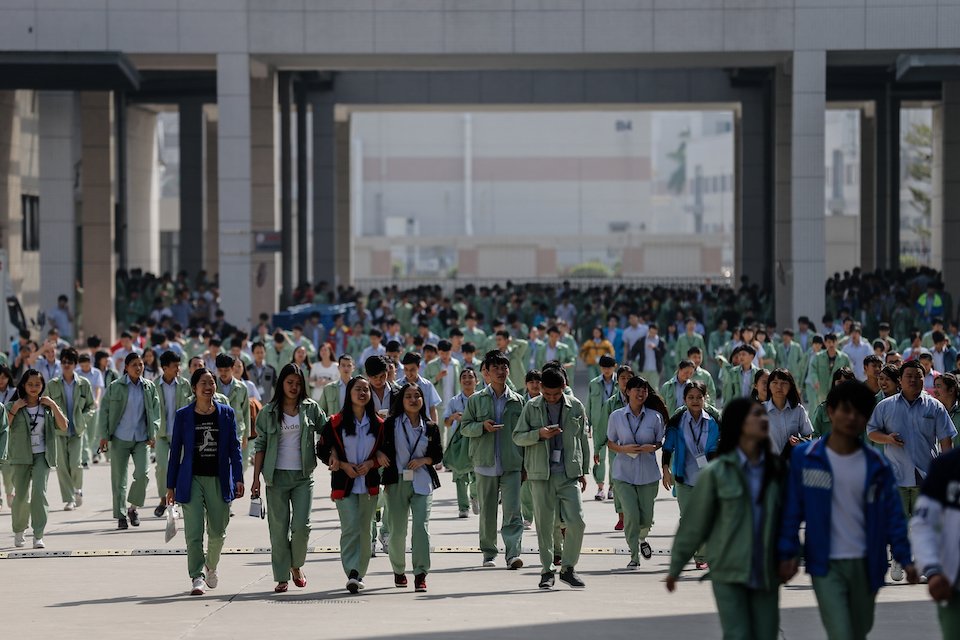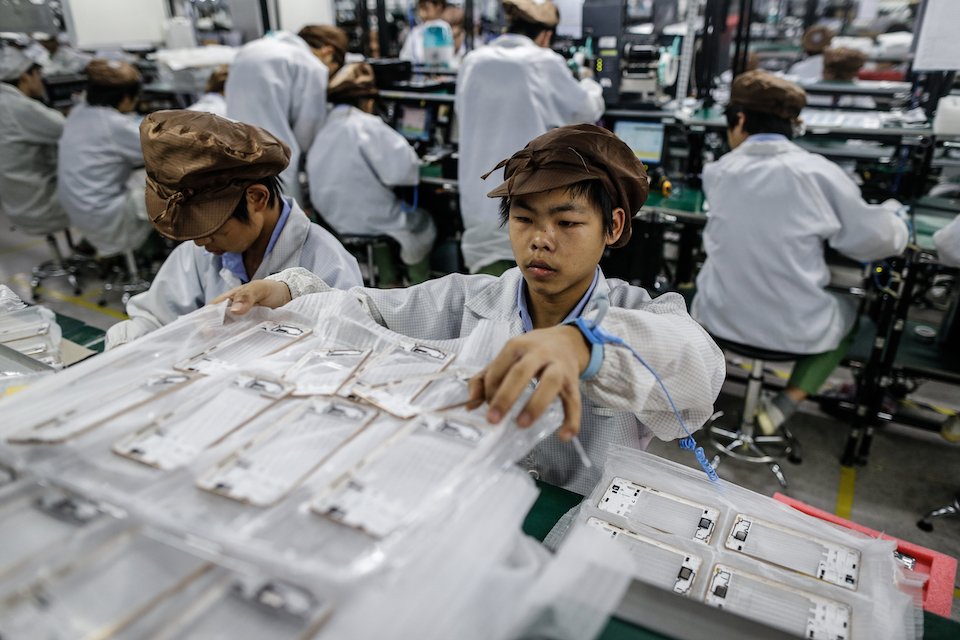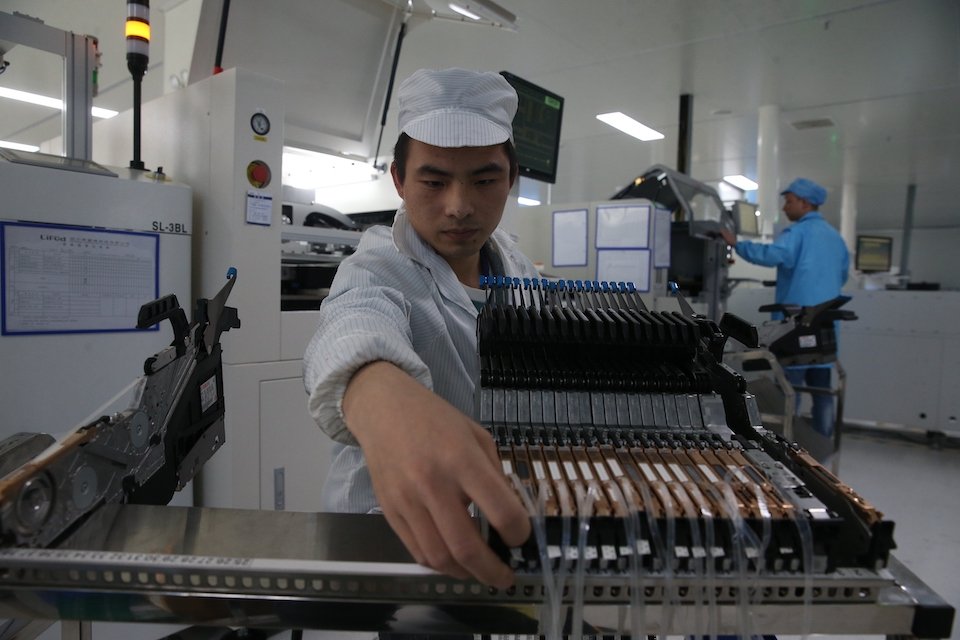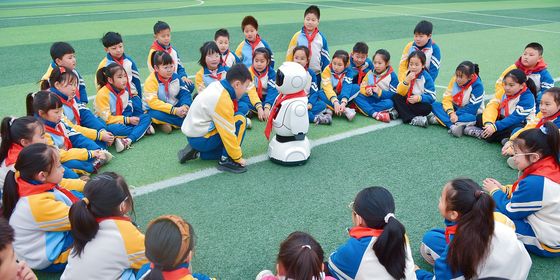Long hours, low pay, and intimidation a regular feature of vocational work study programs
It was a completely avoidable tragedy. On the afternoon of June 25, a 17-year-old student “intern” at a Shenzhen factory, identified under the surname Yu, jumped to his death from his dormitory balcony.
A final-year computer student at Hanjiang Technology School in Shiyan, Hubei province, Yu had been sent to the factory on an “internship” arranged by his school—but far from doing any work related to their major, he and his classmates were assigned repetitive manual labor: packing and moving boxes, and working on assembly lines, for 11 hours a day at 14 RMB (2.17 USD) an hour. Yu was unable to handle the workload and had missed work four times mostly due to health reasons, and with permission from his supervisor.
Yet on the morning of his death, Yu found out he’d been marked “truant” yet again. In a WeChat group shared with Yu’s whole class, his teacher threatened to expel him from school if he took any more time off, alleging that he showed a “lack of remorse” and a “bad attitude.”
Throughout the tragedy, both Yu’s school and the factory flouted a string of provisions from the national “Management Regulations on Internships of Vocational School Students” enacted by the central government in 2016 to protect vocational school students and clarify their rights. According to the regulations, internships must match the student’s major; students are allowed to select their own place of internship; students under 18 cannot be assigned overtime work and night shifts; and interns cannot be paid less than 80 percent of what regular workers earn during the workers’ probation period.
But Yuan Yayang, a lawyer specializing in labor cases, wrote on social media platform Zhihu that it’s “common for vocational schools to violate the regulations,” though he refused to comment further when TWOC contacted him.
Tales about students being placed in exploitative internships by vocational schools have long been reported by Chinese media: “Almost every summer, one can read reports about interns being exploited,” fumed Vista magazine in an article about Yu’s death. In March, a vocational school in Zhengzhou made it compulsory for a group of students, majoring as flight attendants, to intern at a water-heater factory if they wanted their diploma. Their teacher confiscated the students’ ID cards on arrival, and they worked on the assembly lines for 12 hours a day, with two days off each month.
Students typically attend vocational secondary schools, known as “secondary professional schools” (中等专业学校) or zhongzhuan (中专) for short, after finishing their nine years of compulsory education. Each year, around half of the students who take the National High School Entrance Exam (zhongkao) fail to qualify for high school, and can drop out of education or enroll in vocational schools where they train for blue collar jobs.
Though there are well-regarded institutions like Beijing’s privately-run Bailie Institute, praised in a formal letter by President Xi Jinping in 2017, “most vocational school students just idle around doing nothing,” claims 21-year-old Lin Fang (pseudonym), a graduate of a logistics course at a railway institute in Jiangsu province who interned in factories with vocational school students from around the country. “Bullying is rather common in these schools and teachers tend to solve problems simply by avoiding trouble.”
The vocational education sector—including both professional secondary schools and colleges, as well as short-term professional training courses—saw rapid growth in recent decades, with student numbers more than tripling between 1980 and 1990 from 2.4 million to 6.6 million according to the government’s China Education Statistics Yearbook. By the end of 2020, there were 11,500 vocational secondary schools and colleges in China, holding 28.6 million students, according to Vista.
Internships are a required part of any vocational course, a practical element of learning meant to “strengthen students’ comprehensive capability,” according to the current government regulations on Internships of Vocational School Students.
However, vocational schools may have financial reasons for keeping their students slaving away in a job unrelated to their study. According to one of Yu’s classmates, the factory manager claimed they paid the interns the same wage as their regular workers—26 RMB an hour—which suggests that the teacher, school, or the agency that arranged the internship took a commission for their job placement.
In the wake of Yu’s death, many users purporting to be former students and teachers at vocational schools took to social media platforms such as Zhihu and short-video app Douyin to share similar internship stories from factories to hotels, kindergartens to hospitals. Most stated that internships were part of the graduation requirements.
Others declare it’s an open secret that vocational schools operate internship schemes to shorten the semester and reduce costs, and profit from placing students in factory jobs. “One of my relatives is a teacher of a private vocational school,” one netizen commented on Zhihu. “Their biggest earnings come from the school’s commission on how many students they introduced to work here [in factories].”
Lin was asked to intern at a logistics company in Jiangsu every year as part of her studies, packing goods during the buying rush that occurs over Single’s Day. “We spent a whole day standing there, working from 6 a.m. to 9 p.m.” she tells TWOC. “We were not allowed to sit down as there were several inspectors patrolling in the workshop.”
The exhaustion brought about by this workload is damaging at best, fatal at worst. In September 2020, 16-year old vocational student Li Zhicai of Shandong province died after falling from his dormitory window, the police ruling it as a “suicide due to psychological problems.” Li had twice asked his parents to come home, saying he was “too tired” after working 11 hours a day and half a month on the night shift.
During Lin’s internship, students were regularly intimidated when they protested the conditions. Two students who continually refused to work overtime further were taken into a private room and allegedly told by their supervisor: “There’s a count of how many people die in our factory every year, but if we threw out some dead bodies now no-one would ever know.” Lin’s team leader reported the situation to their teacher, and fortunately, her school withdrew the students from the factory.
Lin claims to have seen secondary school students as young as 14 working in this factory during her time there, all from vocational schools, working for just 10 RMB an hour when fully-qualified workers received 18 RMB. “Because they were young, they didn’t realize they were being abused. Workers threatened them, saying that if they were found absent, they were not allowed to graduate…They once told us they had protested, but it rarely worked since their school didn’t care about them.”
Parents of vocational school students, who often have little education themselves, are usually keen for their children to graduate and reluctant to make trouble with the school. Yu and his classmates’ parents had expressed concern when they heard that their children would be working in Shenzhen for their internship, as Guangdong province was experiencing a localized Covid-19 outbreak at the time, but backed down after Yu’s teacher insisted in a WeChat message, “This is part of the third-year syllabus and must be done!” When Yu complained to his father that he was tired and had headaches from the long hours, the older man, afraid his son wouldn’t achieve his dream of joining the military without a diploma, asked him to “hang on a little longer.”
Li Zhicai’s case was settled out of court, by compensation only. In Yu’s case, the school may need to compensate his family for violating regulations, but they might not be charged under the Criminal Law, which defines “forced labor” as coercing someone to work using “violence, threats, or restrictions on personal freedom.”
The vocational system continues to receive government backing. In March 2019, Premier Li Keqiang praised vocational schools as a way to ease competition in the job market and encouraged high school graduates and migrant and laid-off workers to enroll, aiming to expand student numbers by 1 million by the end of the year. In 2020, the Ministry of Education issued a notice pledging by 2023 to improve standards like teacher training and teacher to student ratios in vocational schools, and to build 100 high-quality schools for rural revitalization.
It remains to be seen whether this latest tragedy will lead to lasting reforms. “I’m so sorry that a 17-year-old boy lost all possibility of building a better future for himself,” says Lin. “The government should regulate [vocational] school operating procedures and improve school qualifications: on teachers, the teaching environment, and the facilities. This will guarantee that learning will actually be a part of students’ daily life, and there are no other safety hazards.”
“[Some vocational schools] are set up to make money by making students purchase books or courses, or don’t teach but are just human resource companies disguised as schools. Those are illegal.”















